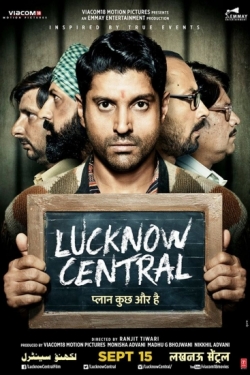-
Average.
Good : performance of the supporting cast , potential storyline , impressive start , decent musical score
Weakness : Disappointing lead actors , lackluster direction , many forced situations, loopholes in the plot0October 13, 17 -
Director Ranjit Tiwari's debut feature film is about a bunch of jail inmates forming a music band as a cover to execute their escape plan. While it has all the regular elements of a prison film that push it to the bracket of mediocre cinema, one of the few things that sets it apart is that not much time is spent in the proceedings (which is ironical if you consider it in relation to a court).
Farhan Akhtar plays Kishan Girhotra who is accused, tried, and convicted within five minutes, which is sort of an assurance that the film's message is something else and not about political stranglehold or non-superficial corruption in the Uttar Pradesh capital. Son of a poor librarian, Girhotra had the aspiration to create a desi music band while he was free, but now that things have changed - not much to his fault - he decides to do so while behind bars. The difference, and thus the primary problem, with the film is that it is not clear if Girhotra wants freedom or considers forming a band in prison as his definition of freedom. Director Tiwari tries to provide answers at the end but falls prey to his own ambition to drive the musical drama towards a nail-biting prison escape (attempt) culmination.
Akhtar looks out of the place in the film, only throwing defective pronunciation at you to show that his character hails, in fact, from Lucknow. His (and his inmates) attires may have been thought over but do not help much in convincing their root. Having said that, he gives a decent performance as a wannabe musician. Girhotra once tries to show his work to a famous singer and ends up with a crushed CD in his hands - showcasing the hard truth about the music industry. (So, your chances of getting in is better if you were incarcerated?) Whatever may be the message of the film, having originated from a real-life story hardly adds up to the plausibility. The talented supporting cast put up a good show too, with extra points to Deepak Dobriyal, Inaamulhaq, and Rajesh Sharma who play characters that form the rest of the band. Diana Penty is the puppet that the makers use to show a sliver of romance in the film, but thankfully, never pursue it completely. A serious conversation between Penty's activist character and a police officer is supported by a funny background score - which is the best effort made at comedy, reminding us that the film should not be perceived as serious.
There is nothing novel in the film for an informed viewer to watch and appreciate. The usual prison tiffs between so-called "gangs", territory brawls, a menacing villain in the form of jail warden (a role made just for Ronit Roy), and the unexplored, impracticable escape plan. I am personally not a fan of films where a character introduces other characters - as Dobriyal's does for the other band members - because it exposes poor writing and narration. The good thing, however, is that the characters mimic other people in the film, which shows continuity and thought. For example, a police officer uses the words of the CM to reprimand one of his subordinates, and Pentry's character does the same when she utters an Orson Welles quote borrowed from a librarian.
I have already mentioned the implausibility of the plot, and one of the reasons why it affects the viewing experience so much is that the escape plan is never explored in detail. How are these people going to get out? A detail like the 15-second power generator window is not the only thing. The audience needs details and Lucknow Central chooses to keep them in the dark.
The plot further tries to humanize itself by exploring the characters instead. What prison does to the people waiting outside is one story arc, which again reinforces my point of non-novelty. Supported by a good and believable production setup, songs that gels with the theme, and performances that are watchable, the film pulls all known tricks available in the "prison movie" textbook, but fails to add freshness to the mixture.
At the end, it is clear what Girhotra wanted, but I'm not sure if I can say the same thing about the movie.3September 17, 17












